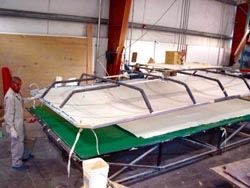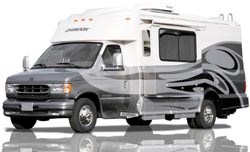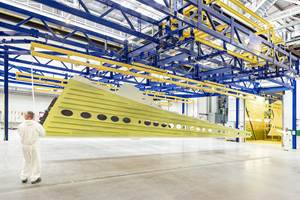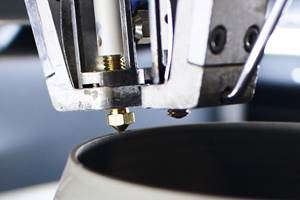RV manufacturer converts to all-composite motorhome shells and floors
Since 1971, Trail Wagons - Chinook RV Inc. has built motorhomes with one-piece, molded fiberglass shells at its 115,000 ft2 plant in Yakima, Wash, U.S.A. Claiming that the shell design is essential to RV structural integrity, ease of maintenance and weather resistance, the company offers the U.S. RV industry's only
Since 1971, Trail Wagons - Chinook RV Inc. has built motorhomes with one-piece, molded fiberglass shells at its 115,000 ft2 plant in Yakima, Wash, U.S.A. Claiming that the shell design is essential to RV structural integrity, ease of maintenance and weather resistance, the company offers the U.S. RV industry's only lifetime structural warranty. In 2002, however, the shells were re-engineered in an effort to eliminate stress cracks in the finish that previously combined gel coat, ceramic shield, and a single polyester skin laminate with plywood stiffening panels. Chinook's new shell is a lightweight sandwich construction, featuring a vinyl ester resin composite recommended by Eastman Chemical Company (Kingsport, Tenn., U.S.A., select 201), which assures shell stability in temperatures from well below freezing to as high as 110°C/230°F, preventing blistering or cracking. Gel coat is applied to the massive one-piece molds for the company's 21 ft and 24 ft models. A layer of vinyl ester resin and chopped strand glass are sprayed up. Then, 0.5-inch-thick closed-cell PVC structural foam from DIAB Inc. (Desoto Texas, U.S.A., select 202) is embedded, using a vacuum bag, in putty made from Eastman's polyester resin, followed by a final sprayup layer of polyester resin and fiberglass.
"After just one year of using the new shells, the results have been astounding - none of the new RVs have shown a single stress crack," says Jeff Gaskell, Chinook's Fiberglass Division manager, who was so impressed, he initiated further innovations: For Chinook's new and larger 25 ft and 27 ft motorhomes, which accommodate queen-size beds, dry-baths and other amenities, Gaskell needed to reduce floor weight to avoid exceeding the U.S. standard for Gross Vehicle Weight (GVW). Previously, floors were made of laminated 1.5-inch plywood, and workers used handheld laminating rollers to apply the polyester resin/glass-laminated bottom. Gaskell had seen a vacuum infusion process used to make fiberglass parts for yachts, and adapted it for fabrication of a new floor design featuring sandwich construction. Skins of 40 oz/yd2 quadraxial glass fabric from Vectorply (Phenix City, Ala., U.S.A., select 203) are layed up in a flat mold on both sides of DIAB balsa core that comes pre-cut to size, scored and perforated to ensure uniform resin transfer throughout the part. Sixteen gallons of Eastman's vinyl ester resin are required to infuse an entire, vacuum-bagged 25-ft floor (see bottom photo), optimizing glass-to-resin ratio, eliminating waste from overspray and resulting in a 15 percent resin savings. Infusion takes about 11 minutes, and (due to Eastman's customized promoter and initiator system) the floor is ready for demolding after only a two-hour cure, with nearly 100 percent reduction in styrene emissions. "The process has reduced the floor weight by 35 percent and increased compression, tensile, and sheer strength by 300 percent, enabling us to expand motorhome size," says Gaskell.
Even more impressed than before, Gaskell now plans to vacuum infuse shells as well, and is experimenting with using Light RTM(resin transfer molding) to replace open molding for smaller parts, such as storage doors, running boards and shower components.
Related Content
Plant tour: Joby Aviation, Marina, Calif., U.S.
As the advanced air mobility market begins to take shape, market leader Joby Aviation works to industrialize composites manufacturing for its first-generation, composites-intensive, all-electric air taxi.
Read MoreJeep all-composite roof receivers achieve steel performance at low mass
Ultrashort carbon fiber/PPA replaces steel on rooftop brackets to hold Jeep soft tops, hardtops.
Read MorePlant tour: Spirit AeroSystems, Belfast, Northern Ireland, U.K.
Purpose-built facility employs resin transfer infusion (RTI) and assembly technology to manufacture today’s composite A220 wings, and prepares for future new programs and production ramp-ups.
Read MoreA new era for ceramic matrix composites
CMC is expanding, with new fiber production in Europe, faster processes and higher temperature materials enabling applications for industry, hypersonics and New Space.
Read MoreRead Next
VIDEO: High-volume processing for fiberglass components
Cannon Ergos, a company specializing in high-ton presses and equipment for composites fabrication and plastics processing, displayed automotive and industrial components at CAMX 2024.
Read MoreDeveloping bonded composite repair for ships, offshore units
Bureau Veritas and industry partners issue guidelines and pave the way for certification via StrengthBond Offshore project.
Read MoreAll-recycled, needle-punched nonwoven CFRP slashes carbon footprint of Formula 2 seat
Dallara and Tenowo collaborate to produce a race-ready Formula 2 seat using recycled carbon fiber, reducing CO2 emissions by 97.5% compared to virgin materials.
Read More




















